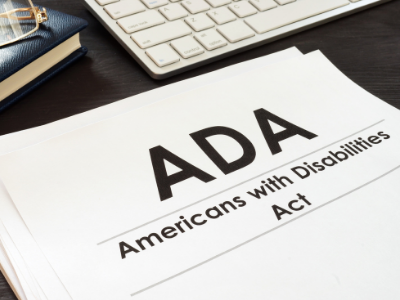Updated Guidance for Employers: COVID-19 and the ADA
January 21, 2022
By Shelby J. Bensinger
On December 14, 2021, the U.S. Equal Employment Opportunity Commission (EEOC) issued updated guidance to clarify the circumstances under which COVID-19 may be considered a disability under Title I of the Americans with Disabilities Act (ADA). This has been one of the numerous questions facing employers throughout the pandemic, and following the updated guidance it is likely that the question of whether COVID-19 fits the ADA’s definition of “disability” will continue to play out in courts.
Below are some key takeaways from the updated guidance that employers should be aware of going into 2022:
1. The ADA’s definition of “actual disability” applies to COVID-19.
Under the ADA, an “actual disability” is defined as a physical or mental impairment that substantially limits one or more major life activities.
2. COVID-19 can be a disability under some circumstances.
The guidance provides several examples of when COVID-related symptoms may substantially limit an individual’s major life activities such that they have an actual disability under the ADA:
- An individual diagnosed with COVID-19 who experiences long-term symptoms related to the virus such as headaches, dizziness, and difficulty remembering or concentrating.
- An individual diagnosed with COVID-19 who experiences long-term symptoms related to the virus such as difficulty breathing, heart palpitations, and chest pain.
- An individual diagnosed with “long COVID” who experiences symptoms of intestinal pain, vomiting, and nausea that last, or are expected to last, for several months.
3. COVID-19 is NOT always an actual disability under the ADA.
An individual who contracts COVID-19 and is asymptomatic or experiences flu-like symptoms that resolve within several weeks is not substantially limited in a major life activity and therefore does not have a disability under the ADA.
4. Whether an individual case of COVID-19 is an actual disability always requires an individualized assessment.
Whether or not an employee has a case of COVID-19 that constitutes an actual disability is a fact-intensive inquiry. Employers should use a case-by-case approach and make an individualized assessment.
5. Employees with qualifying disabilities are not automatically entitled to reasonable accommodations under the ADA.
Individuals are not entitled to an accommodation unless their disability requires it, and an employer is not obligated to provide an accommodation that would pose an undue hardship.
6. An employer may require medical documentation regarding an individual’s diagnosis.
An employer may request that an employee provide reasonable medical information to substantiate a request for accommodation, or that the employee sign a release allowing the employer to contact their health care provider directly. If an employee refuses to cooperate in providing the necessary documentation, an employer can lawfully deny the request for accommodation.
As the country enters into the third year of the pandemic, employers are becoming more and more impacted by the effects of regulations associated with COVID-19 in the workplace. Employers must be mindful of their potential exposure to claims that could arise under the ADA and other regulations. The attorneys at Flint, Connolly & Walker are dedicated to helping employers take a proactive approach to ensure that they are prepared if and when they are confronted with these issues.
Shelby J. Bensinger is an associate attorney with Flint, Connolly & Walker, LLP who represents clients in a variety of civil and business litigation matters, including labor and employment issues.

